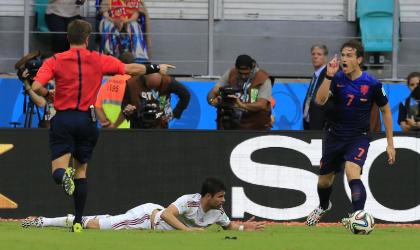FIFA considering review system to improve officiating at World Cup

RIO DE JANEIRO – Perhaps this is the worst of it, and World Cup refereeing will never ever be this bad again.
At least entertain that thought – in between roars of laughter – as a snippet of evidence indicates better days are ahead for the most reviled officials in the world.
FIFA chief Sepp Blatter suggested this week that managers should be allowed to challenge referee's decisions – much like in the NFL – and at a press conference here Saturday, another FIFA official chimed in without holding up a stop sign.
When asked about Blatter's remarks, Gerard Houllier of FIFA's Technical Study Group said, "It shows FIFA has an open mind about everything and anything."
Even if these are empty words, this is a notable change in an organization that has made Bud Selig and Major League Baseball seem radically progressive. After a long spell of resistance, the goal-line cameras are in use in this tournament, and Blatter seemed convinced that managers should have the right to challenge referees.
"Why don't we give team managers the possibility of two challenges for refereeing during the match?" Blatter told delegates at the FIFA Conference in Sao Paolo. "If the manager disagrees with a decision, why should he not ask for an immediate TV review?"
That makes an astounding amount of sense, especially in light of the controversial penalty call on Croatia after Fred's blatant dive in Brazil's opening 3-1 victory on Thursday. It's not at all clear what would be under the challenge umbrella – red cards? Yellow cards? Non-calls? – but that was a decision that clearly changed the momentum and perhaps the outcome of a huge game. And it was pretty obvious on replay.

FIFA Head of Media Delia Fischer insisted on Saturday that organization officials are not concerned about crowds affecting referees. "When in the stadiums," she said, "they are focused on the games themselves." But the officials are humans and most or all of them would admit imperfection. Replay would help not only in getting the call right, but also in protecting them from the very public consequences of getting calls wrong.
Any addition of challenges would face bureaucratic hurdles. This is FIFA, after all. Scottish soccer executive Stewart Regan has said challenges would be "a complete departure" for the sport. But it's conceivable that the four years in between World Cup tournaments might be enough to make this happen. Sadly, more referee errors on the world's stage will only galvanize the momentum.
The roadblock, other than the usual inertia, is the essence of the sport. Soccer is not like baseball and American football, where there are constant stoppages. The game is supposed to move fluidly. So time out for review would interrupt soccer in a way that fans are not used to.
"If the manager has an appeal," Regan said last week, "and that results in the game being stopped, that interferes with how you and I understand football operates, which is fast-moving, flowing, and that's what fans have come to expect."
The problem with that line of thinking is that what fans have come to expect even more is referee-related controversy. And that expectation is only bolstered by recent reports of match fixing in smaller tournaments elsewhere in the world. Extra stoppage time to get a call right is unlikely to enrage fans, players and coaches anywhere near as much as poor decisions do.
Only one good decision by FIFA could prevent many more of those poor decisions, and protect a sport that happens to need a few more fail-safes.

 Yahoo Sports
Yahoo Sports 